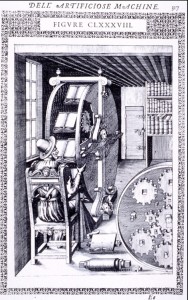The cost of data storage and retrieval is hardly anything that an individual thinks about today. Some of us may need to delete things from our devices but actual storage of data is not an issue. A tweet from SciencePorn last year demonstrated the cost of 1gb of storage over time:
- 1981 $300000
- 1987 $50000
- 1990 $10000
- 1994 $1000
- 1997 $100
- 2000 $10
- 2004 $1
- 2012 $0.10
I would love to have a better source than a tweet but it serves its purpose in this post.
The data question today is one of where and how we keep our physical storage devices. And yes, this could be about hard drives that hum with lights that shine but my idea today is more about the way in which we store our physical books. When it comes to music and movies I have moved completely digital – the thought of buying, carrying and storing plastic in order to enjoy those medium is foreign to me.
But books are a problem. I have an e-reader and a tablet both of which have a seemingly endless array of books on them. Reading from these devices is not a problem. I do have issues with commenting texts, on remembering where in the text I read something and finding a book that I have digitally.
All the devices have the ability to make notes but none are better than a pencil. My books contain small texts and question marks. Exclamation marks can sometimes mean I agree, disagree or even just approve of the order in which the words came. Typing will not really do it for me. The way’s in which the marks where scratched also make a difference – when I really disagree I will underscore heavily or circle words. It’s so annoying trying to do that digitally. Also I noticed something even more important: I never looked at my digital notes. They were ephemeral: I wrote them; I felt pleased; and then I forgot them completely. Finding them and recreating the context in which they were written isn’t working for me.
Another problem, for me, is the loss of geography in the book. I first noticed that it didn’t matter how engrossed I was in a text, I would often forget what the book was called or who the author was – While I was reading! But more importantly I could almost never find the passages that I remembered reading. In a physical book I would know approximately where on the page and in the book the passage was. There is a loss of context in the digital version.
But most importantly was the loss of books. I would collect books to be read but they would all disappear in the neutral packaging of the device. Nothing happened to remind me of their existence, no guilty pangs to goad me into reading. My collection of books was increasing while my reading time was shrinking.
Dreams of devices and systems to collect the worlds knowledge are old. But we now have overcome most of the barriers to such systems and by solving the problem have lost the books. Ok, maybe its just me. But I cannot help but think of the wonderful device dreamed of by Captain Agostino Ramelli:
This is a beautiful and ingenious machine, very useful and convenient for anyone who takes pleasure in study, especially those who are indisposed and tormented by gout. For with this machine a man can see and turn through a large number of books without moving from one spot. Moreover, it has another fine convenience in that it occupies very little space in the place where it is set, as anyone of intelligence can clearly see from the drawing.
The advantage of his device is that it does not hide the books needed to be read. You could naturally just scroll passed the book but it was still there demanding attention. The digital world gives us convenience, but too much convenience is not a good thing.
